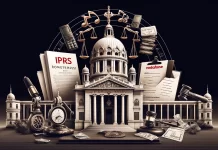T Series and Saregama had filed independent copyright infringement suits against several radio broadcasters for violating the provisions under Rule 29 of the Copyright Rules, 2013 while invoking their statutory license in furtherance of the IPAB judgement dated 31st December 2020.
The Delhi High Court vide its order dated 9th November, 2021 ruled in favour of the plaintiff music labels and restrained the defendant radio broadcasters from broadcasting/communicating to the public and/or otherwise exploiting the plaintiffs’ copyright works through the defendant‘s FM Radio channels/stations without complying with Rule 29, especially, with Rule 29(4)(i)(j) and (k) of the Copyright Rules, 2013. Read judgement here.
The Court while granting the injunction noted “At this stage, this court, as noted above by the Supreme Court, cannot re-write the provisions of Rule 29 (4) of the Rules. The defendant has chosen to voluntarily abandon the voluntary license regime that they were earlier following in compliance of Section 30 of the Act. At this stage, once they have shifted to the statutory license scheme for broadcasting as spelt out in Section 31D of the Act, prima facie, they would have to comply with the terms and conditions of the Statute and the Rules thereof. The defendant has admittedly failed to comply with the said Rules. The plaintiff has made out a prima facie case”.
A detailed analysis of the underlying issue and similar disputes before Madras High Court and Bombay High Court can be accessed here.
Context:
Section 31 D of the Copyright Act which deals with the statutory licensing provisions, permits a radio broadcasting organisation to communicate to the public by way of broadcast or by way of performance of a literary or musical work and sound recording. Section 31D (2) of the Act provides that the broadcasting organisation will give a prior notice, in such manner as may be prescribed, of its intention to broadcast the work stating the duration and the territorial coverage of the broadcast and shall pay to the owner of rights in each work royalties in the manner that may be fixed by the commercial court. Rule 29 of the rules provides the method of notice for communication under Section 31 D (2) of the Act. Rule 29 (4) gives the particulars required to be given in such notice.
The broad controversy revolves around Rule 29(4) (i) (j) and (k) of the Rules which require the prior notice to be provided by radio broadcasters to contain name of the programmes, details of the time slots, duration and period of the programme, in which works are to be included and details of the payment of royalties at the rates fixed by the Board.
Arguments advanced by Plaintiff:
(i) In the absence of voluntary license under Section 30, a defendant can broadcast sound recordings forming part of the plaintiff‘s repertoire subject to strict compliance with the statutory provision i.e. Section 31 D of the Act. Rule 29 of the Copyright Rules contains the manner prescribed for the advance notice that must be sent under Section 31D(2).
(ii) Section 31D is an expropriatory legislation and therefore, it requires strict compliance of statutory provisions including Rule 29 of the Rules.
(iii) The Act and the Rules require an advance notice of broadcast of work much specifically stating the details provided under Rule 24 (4) in a work specific manner and the defendant has in the impugned notices completely failed to identify the plaintiff‘s works that are proposed to be broadcast under the statutory license and the defendant has failed to provide the required details in relation to such broadcast which are necessary. The notices issued by the defendant are grossly in non-compliance to the Scheme of statutory license.
(iv) Reliance placed on the judgment of the Supreme Court in the case of Saregama India Ltd. vs. Next Radio Limited & Ors., being 2021 SCC OnLine SC 817.
Arguments by the Defendants:
(i) On account of exorbitant royalty rates coupled with monopolistic and dubious practice adopted by the plaintiff in its voluntary license arrangement, the defendant invoked the statutory license under Section 31D. It is urged that the royalty rates fixed by IPAB in its order dated 31.12.2020 for invoking statutory license are on an average approximately 60% lesser than the royalty rates set by the plaintiff in the voluntary license agreement.
(ii) The defendant has given prior notices of its intention to broadcast the works of the plaintiff i.e. through its advance notice.
(iii) That the submission of the plaintiff that notices should include minute details of every second of broadcast of sound recordings is unfounded. It is stated that the time slot, duration, amount of every second or minute can only be determined at the end of every calendar month post actual broadcast.
(iv) Section 31 D pertains to the entirety of the defendant‘s intention to broadcast in any calendar month and the same ought not to be confused with duration of the programme under Rule 29 (4) (j).
(v) Even in the earlier voluntary agreement with the plaintiff all the details were sent at the end of month as is apparent from a reading of the agreement.
(vi) That the present suit is a motivated suit as the plaintiff seeks to put obstructions in the implementation of Section 31 D of the Act.
(vii) That what the plaintiff is contending is impossible to be complied with. It is stated that a radio jockey plays songs on the basis of requests received on phone, social media, etc. and on interaction with the audience. He cannot in advance decide which song is going to be played. Then, there are updates of traffic, updates of cricket scores, etc. Songs can be changed. The medium of radio is a dynamic live interactive medium. There cannot be any straight jacket formula. Creativity/spontaneity of a radio jockey cannot be curtailed in the manner as sought by the plaintiff.
(viii) The plaintiff only seeks to put an impediment in the operation of Section 31D of the Act.
(ix) Rule 29 is directory and minor aberrations, if any, can be no ground for the plaintiff to file the present suit.
Ruling:
The issue before the court was whether it is mandatory for the defendant to give details as elaborated in Rule 29(4) of the Rules?
The Court relied on the judgement of the Supreme Court in Saregama India Ltd. vs. Next Radio Limited & Ors wherein the Apex Court expressed the view that the difficulties expressed by the broadcasters as elaborated in para 19 of the said judgment cannot be a ground for re-writing the statutory rules in interlocutory proceedings. The said judgment further holds that the impugned order of the Madras High Court converts the second proviso of Rule 29 into a “routine procedure” instead of an exception and that the directions of the High Court tantamount to re-writing of the statutory provision. Such an exercise cannot be carried out that too at an interlocutory stage.
Accordingly, the Court was convinced that prima facie case has been made out by the Plaintiff and injunction was granted against the Defendants. Suit has been disposed of.
Image source: here


















